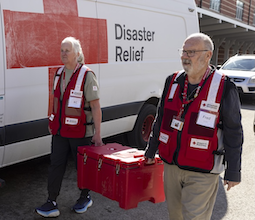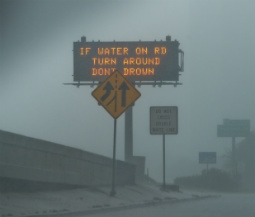Extreme heat is too dangerous to be invisible. Learn more at redcross.org/HeatCheck.
Summer is here, bringing with it dangerous high temperatures week after week across the country.
According to the National Oceanic and Atmospheric Administration (NOAA), this extreme heat will continue. It’s getting warmer each year with last year being the warmest on record so far. Experts report 2025 will be very warm too, with a high chance of it being one of the hottest years ever recorded.
Such extreme heat can be dangerous ─ even deadly. Extreme heat is a leading cause of weather-related deaths in the U.S., and a 2024 study found that heat-related deaths are on the rise. According to the U.S. Environmental Protection Agency, more than 14,000 Americans have died from causes directly related to heat since 1979.
WHAT YOU SHOULD DO The American Red Cross urges everyone to take care of themselves, their loved ones and neighbors by following these three critical steps:
- Stay hydrated. Drink a cup of water every 20 minutes, even if you don’t feel thirsty. Avoid sugary, caffeinated and alcoholic drinks. Check your urine color — dark yellow means to drink more water.
- Stay cool. Spend time in air-conditioned places. If your home is too hot, go to a mall, library or cooling center. Considering sitting in the shade outside, as it may be cooler than a home without air conditioning. Take cool showers or baths to help cool off.
- Stay connected. Check in twice a day on those who are older, have health problems or live alone by texting, calling or knocking on their door. Encourage outdoor workers and athletes to use the buddy system and check in on each other often. Never leave a child or pet alone inside a parked car, and make sure pets have access to fresh water and shade.
HEAT ILLNESS It’s critical to act fast if someone has become ill because of the heat.
Heat cramps are signaled by heavy sweating and muscle pain. Have the person stop what they’re doing, rest in a cool place and drink a cup of water — or a sports drink — every 20 minutes. If they feel sick, pause drinking. Get medical help if cramps last more than two hours or if they have heart problems.
Heat exhaustion is signaled by heavy sweating, weakness, cool and clammy skin, muscle cramps, dizziness, fainting, nausea or vomiting. Have the person stop what they’re doing, rest in a cool place and drink a cup of water — or a sports drink — every 20 minutes. Loosen their clothes and place cool, wet cloth on their body. Get medical help if they are vomiting, don’t feel better in an hour, or if they have heart or kidney problems.
Heat stroke is a deadly condition signaled by high body temperature, rapid heartbeat, confusion, headache, dizziness, fainting, nausea or vomiting. Call 911. Move the person to a cooler place, remove extra clothing and use a wet cloth or a cool bath to cool down. If possible, have them sip a sports drink or water.
IF THE POWER GOES OUT When a heat wave and a power outage happen at the same time, it can be even more dangerous. Stay in air conditioning either at home or at a mall, library or cooling center. If you need to keep medicine cold or use medical devices that need power, talk to your doctor about a backup plan. Keep an ice-filled cooler stocked with food, water and medicine so that they don’t spoil. More information is available here.
Download the free Red Cross Emergency app for real-time weather alerts and heat safety information in both English and Spanish. Find it in smartphone app stores by searching for the American Red Cross or going to redcross.org/apps.
PLEASE GIVE BLOOD Extreme heat can impact the blood supply. Stay cool and save lives by giving blood. Giving blood during the summer months is crucial to ensuring blood products are constantly available in the weeks to come for all patients — including those in trauma situations that may require several lifesaving transfusions. Schedule an appointment to give by visiting RedCrossBlood.org, calling 1-800-RED CROSS (800-733-2767) or by using the Red Cross Blood Donor App.
Summer’s extreme heat can be dangerous for your pets too. Visit here to get information about the steps you should take to help keep your pets safe when the temperatures soar.
















